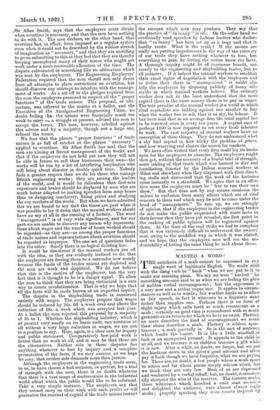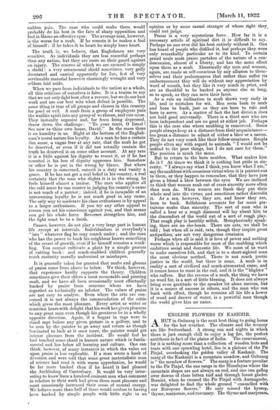WANTED A WORD! T HE antithesis of a snub cannot be
expressed in any single word of legitimate English. We make shift with the slang verb to "buck" when we are put to it to make our meaning plain. We say we were " bucked " by something someone said to us when we are feeling the glow of sadden verbal encouragement ; but the expression is a very new and a rather vague one. It applies to circum- stances as well as to words ; fair weather bucks us as often as fair speech, in fact it witnesses to a linguistic want rather than supplies one. Perhaps there is no form of slight injury which calls forth so much resentment as a snub ; certainly no good turn is remembered with so much gratitude as its reverse for which we have no name. Flattery no more describes the kind of encouragement we mean than abuse describes a snub. Flattery is seldom spon- taneous; a snub generally is. So is the sort of sentence which bucks the hearer. It is like a little windfall of luck or an unexpected present. It appeals to the child in us all, and we treasure it as children treasure a gift while it is new. After a while, no doubt, we forget, but we put the kindness down to the giver's good account and often pay it back though we have forgotten what we are paying for. There are, no doubt, a few people whom a snub spurs to action and for whom praise simply relaxes effort, but we think they are very few. Most of us are depressed and weakened by a verbal rebuff, but, no doubt, it occasion- ally sharpens the wits of the receiver. The historic snubs, those witticisms which knocked a rude man senseless and delighted the audience, were almost always reply snubs ; properly speaking they were retorts inspired by sudden pain. The man who could make them would probably do his best in the face of sharp opposition and find in blame an effective spur. The average man, however, is the worse for a snub. If he resents it he makes a fool of himself: if he takes it to heart he simply loses heart.
The truth is,. we believe, that Englishmen are very sensitive. As individuals they are less resentful perhaps than any nation, but they are more on their guard against an injury. The reserve of which we are accused is simply a shield : a very ornamental shield sometimes, very gaily decorated and carried apparently for fun, bit of very serviceable material however charmingly wrought and very seldom laid aside.
When we pass from individuals to the nation as a whole, all this criticism of ourselves is false. It is a truism to say that we not only fight best after a reverse, but we do our best work and use our best wits when defeat is possible. The same thing is true of all groups and classes in this country for good or evil. A snub from a group of employers puts the warlike spirit into any group of werkmen, and vice versa. They instantly organize and, far from being depressed, throw down the challenge : "To your tents, 0 Israel ! See now to thine own house, David." In the mass there is no humility in us. Right at the bottom of the English- man's moral nature lies loyalty. As a man he has a certain dim sense, a vague fear at any rate, that the snub he got he deserved, or even if it did not actually contain the truth he deserved it on some other account. At any rate it is a little against his dignity to resent it, or if he has resented it his loss of dignity oppresses him. Somehow or other he is put in the wrong by blame. But where his country is concerned, conceit is a duty and vanity a grace. If he has not got a real belief in his country, a real certainty that the man who slights it is in the wrong, he -feels himself almost a traitor. The man who applies all the cold sense he can muster in judging his country's cause is not much of a patriot ; indeed, if he is incapable of an unreasoning loyalty he is not much good in any cause. The only way to moderate his class enthusiasm is by appeal to a larger enthusiasm. If you try any other appeal to reason you set his conscience against you, and that means you get his whole force. Reverses strengthen him, and the fight must be to a finish.
Causes, however, do not play a very large part in human life except at intervals. Individualism is everybody's " ism " whatever flag he may march under • and the man who has the power to buck his neighbour knows something of the secret of growth, even if he himself remains a weak- ling. You cannot cultivate a plant by a simple process of cutting back : and much-snubbed children generally reach maturity morally undersized or Misshapen.
It is generally taken for granted that snubs and gleams of praise come from above to below. We think, however, that experience hardly supports the theory. Children sometimes give their elders a most memorable and piercing snub, and we have all been occasionally most effectually bucked by praise from someone whom we have -regarded as technically an inferior. The values of praise are not easy to analyse. Even where the arts are con- cerned it is not always the commendation of the critic which gives the most pleasure. Every artist or writer or musician hears with delight that his work has given pleasure to any great man even though his greatness lie in a wholly opposite direction. Again, if a beggar in rags were to stand rapt before any given picture in a gallery, and to be seen by the painter to go away and return as though fascinated to look at it once more, the painter would get intense pleasure from the incident. He would feel he had touched some chord in human nature which is funda- mental and lies below all learning and culture. One can think, however, of many instances in which the value set upon praise is less explicable. If a man wrote a book of devotion and were told that some great materialistic man of science had read it with warm approbation, he would be far more bucked than if he heard it had pleased the Archbishop of Canterbury. It would be very inter- esting to know from a hundred eminent men what comment in relation to their work had given them most pleasure and most consciously increased their sense of mental energy. We believe more than half of them would confess to having been bucked by simple people with little right - to an opinion or by some casual stranger of whose right they could not judge. Praise is a very mysterious force. How far it is a necessary article of spiritual diet it is difficult to say. Perhaps no one ever did his best entirely without it. One has heard of people who disliked it, but perhaps they were only remarkably particular as to its kind. To certain proud souls most praise partakes of the nature of a con- descension, almost of a liberty, and has the same effect upon them as a snub. Abnormally shy men and women, again, are made so self-conscious by any allusion to them- selves and their performances that rather than suffer its embarrassment they will do without any appreciation by word of mouth, but they like it very much in print, and are as thankful to be bucked as anyone else so long, so to speak, as they can save their faces. As a rule an inclination to snub shows very early in life, and is mistaken for wit. Men seem born to snub and born to buck, just as they are born to rule and. born to serve. As a matter of fact the last divisic n does not hold good universally. There is a third sort who are born independent and are no good at either job. Perhaps this is the case also where snubbing is concerned. Some people always keep at a distance from their acquaintance— too great a distance to admit of either a blow or a caress. They do not very much like their fellow-creatures. Simple people often say with regard to animals, "I would not be unkind to the poor things, but I do not care for them." The position is much the same. But to return to the born snubber. What makes him do it ? At times we think it is nothing but pride in sin- cerity. "I always say what I think, you know what I am," say the snubbers with conscious virtue when it is pointed out to them, or they happen to remember, that they have just given a friend a blow between the eyes. We are inclined to think that women snub out of crass sincerity more often than men do. When women are frank they put their whole soul into the virtue, and sometimes rather discredit it. As a sex, however, they are, and know they are, born to buck. Selfishness accounts for far more gra- tuitous snubs than sincerity. The sort of man who is called a bear or a rough diamond will lay about him to the discomfort of the world out of a sort of rough play. That rough play is horribly selfish. Metaphorically speak- ing, there are no she-bears. There are cats, we shall be told ; but when all is said, cats, though they inspire great antipathies, are not very dangerous creatures. Perhaps when all is said it is love of power and nothing worse which is responsible for most of the snubbing which embitters social and domestic life. We most of us want to make ourselves felt, and that is to a short-sighted man the most obvious method. There is not much poetic justice in the world, but there is some. A snub is in reality a sort of civilized and much-attenuated curse, and it comes home to roost in the end, and it is the "blighter" who suffers. But the reverse of a snub, the thing we have no word for, is a sort of little blessing. It does not always bring even gratitude to the speaker let alone success, but it is a source of success in others, and the man who can buck with effect, though he remains all his life a hewer of wood and drawer of water, is a powerful man though the world gives him no name.



































 Previous page
Previous page